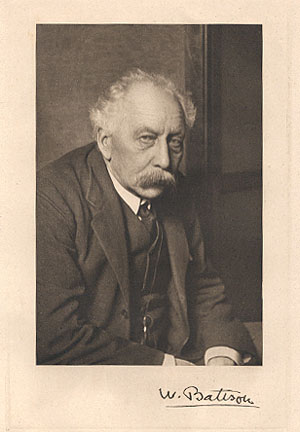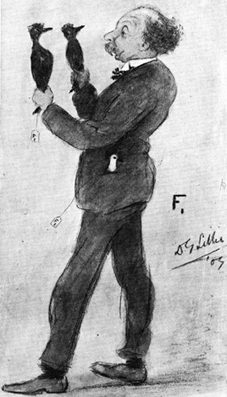<Back to Index>
- Geneticist William Bateson, 1861
- Painter Godfrey Kneller, 1646
- Governor of Newfoundland and Proprietor of the Maryland Colony Cecilius Calvert, 1605
PAGE SPONSOR


William Bateson (Robin Hood's Bay, August 8, 1861 – February 8, 1926) was a British geneticist, a Fellow of St. John's College, Cambridge. He was the first person to use the term genetics to describe the study of heredity and biological inheritance, and the chief populariser of the ideas of Gregor Mendel following their rediscovery in 1900 by Hugo de Vries and Carl Correns.
Bateson was the son of William Henry Bateson, Master of St John's College, Cambridge. He was educated at Rugby School and at St John's College in Cambridge, where he graduated BA in 1883 with a first in natural sciences. Taking up embryology, he went to the United States to investigate the development of Balanoglossus. In 1883-4 he worked in the laboratory of W.K. Brooks, at Hampstead, U.S.A. Turning from morphology to study evolution and its methods, he returned to England and became a Fellow of St John's. Studying variation and heredity, he travelled in western Central Asia.
In 1894 Bateson published Materials for the study of variation: treated with special regard to discontinuity in the origin of species, in which he catalogued unusual physical variations in animal specimens, and classified each variation as either a deviation from the expected number of a certain body part; or as one in which an expected body part has been replaced by another (which he called homeotic). The animal variations he studied included bees with legs instead of antennae; crayfish with extra oviducts; and in humans, polydactyly, extra ribs, and males with extra nipples.
Bateson became famous as the outspoken Mendelian antagonist of Walter Raphael Weldon, his former teacher, and Karl Pearson who led the biometric school of thinking. This concerned the debate over saltationism versus gradualism (Darwin had been a gradualist, but Bateson was a saltationist). Later, Ronald Fisher and J.B.S. Haldane showed that discrete mutations were compatible with gradual evolution. Bateson was the first to suggest the word "genetics" (from the Greek gennō, γεννώ; to give birth)
to describe the study of inheritance and the science of variation in a
personal letter to Adam Sedgwick, dated April 18, 1905. Bateson first
used the term "genetics" publicly at the Third International Conference
on Plant Hybridization in London in 1906. Although this was three years before Wilhelm Johannsen used the word "gene"
to describe the units of hereditary information, De Vries had
introduced the word "pangene" for the same concept already in 1889 and
etymologically the word genetics finds its origin in Darwin's concept of pangenesis. Bateson co-discovered genetic linkage with Reginald Punnett, and he and Punnett founded the Journal of Genetics in 1910. Bateson also coined the term "epistasis" to describe the genetic interaction of two independent traits. In his later years he was a friend and confidant of the German Erwin Baur. Their correspondence includes their discussion of eugenics. His son was the anthropologist and cyberneticist Gregory Bateson.